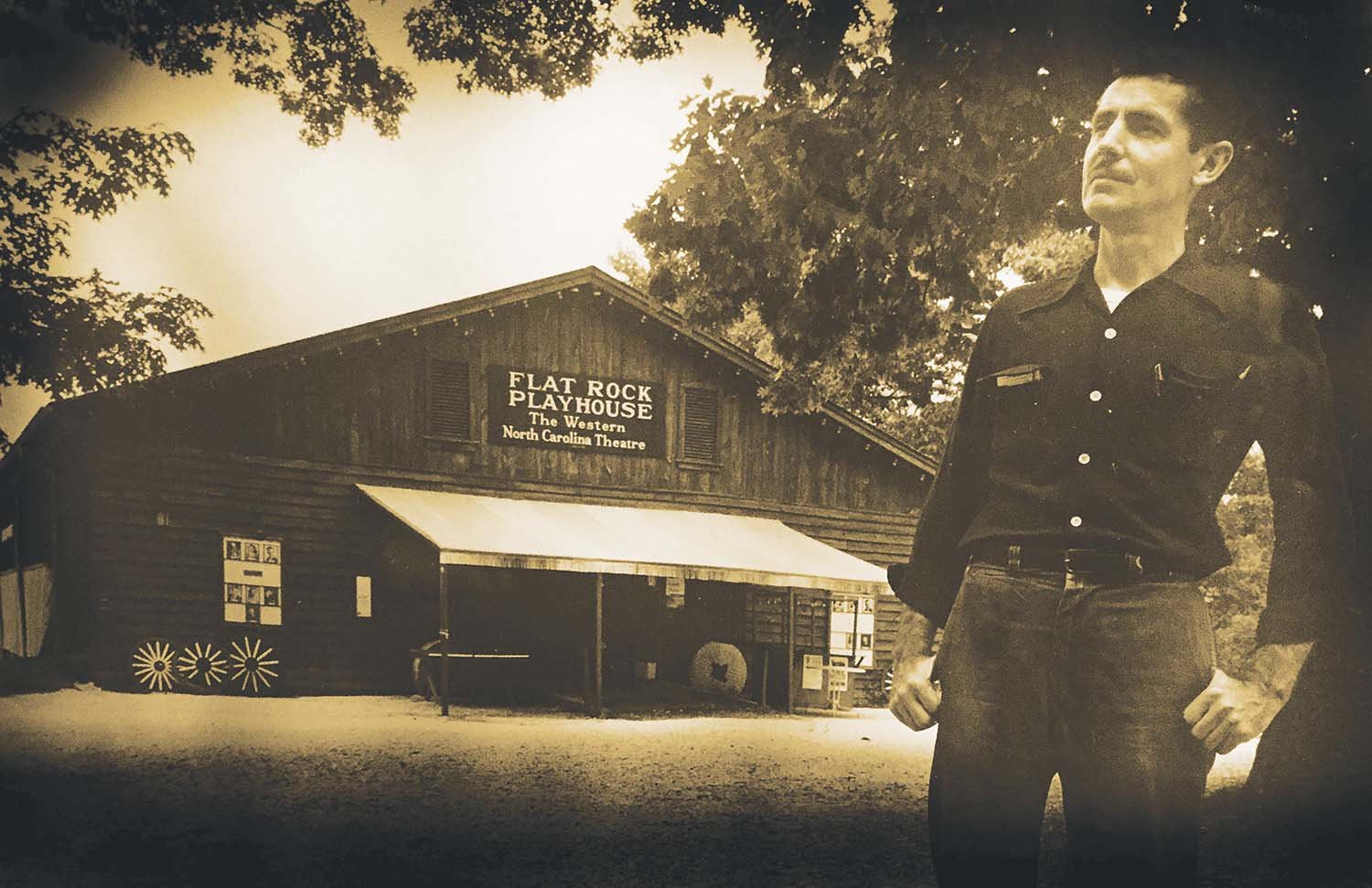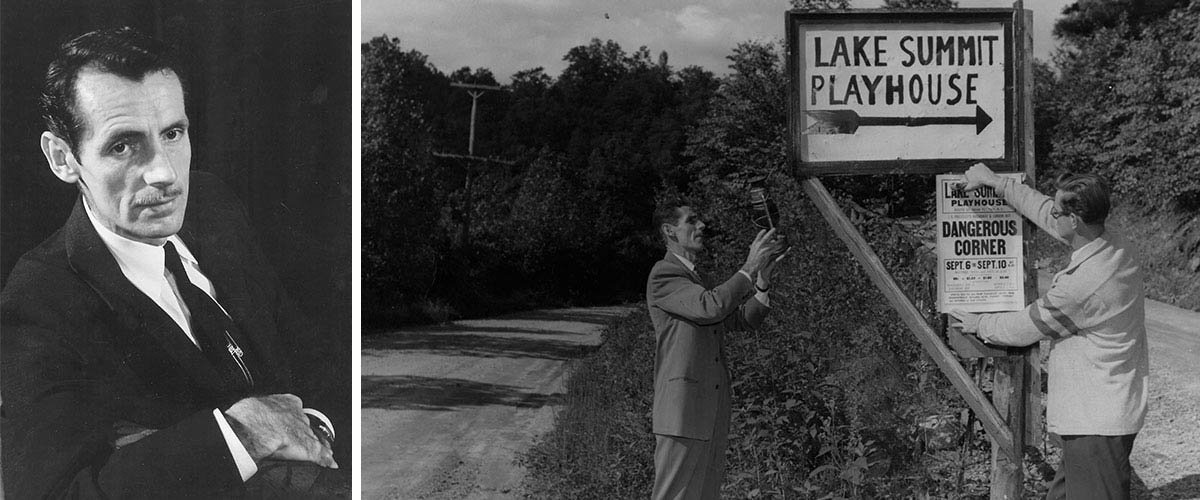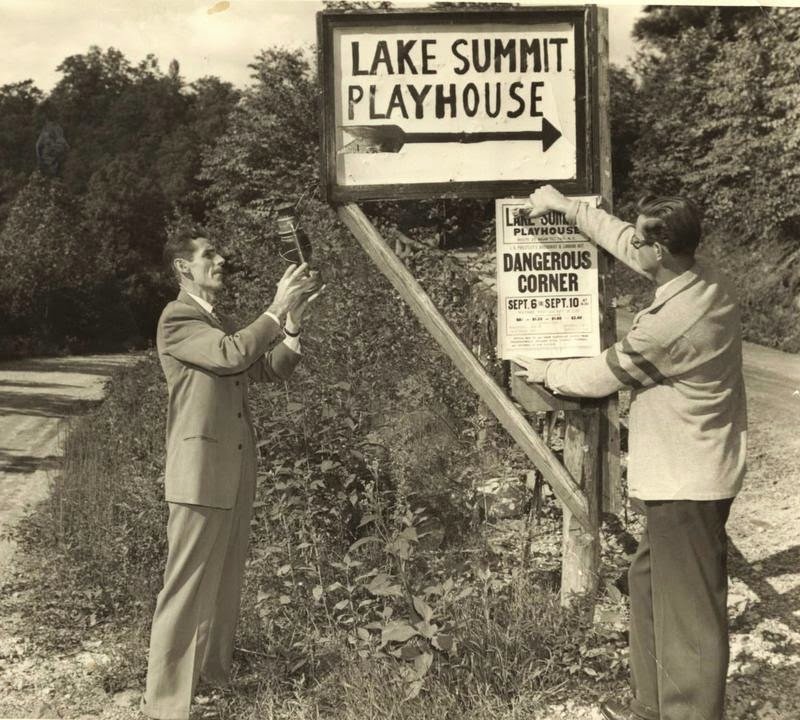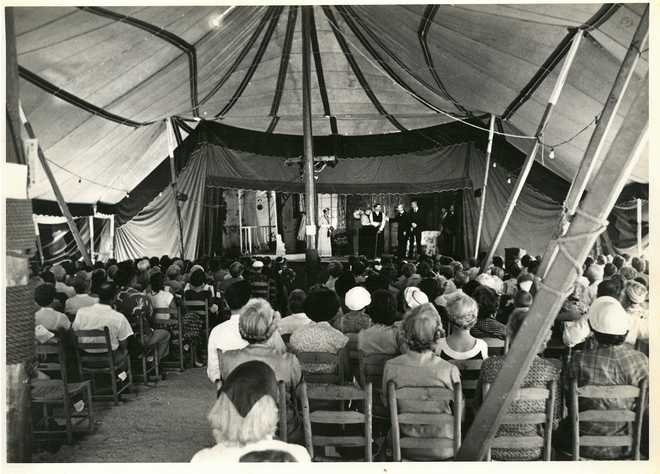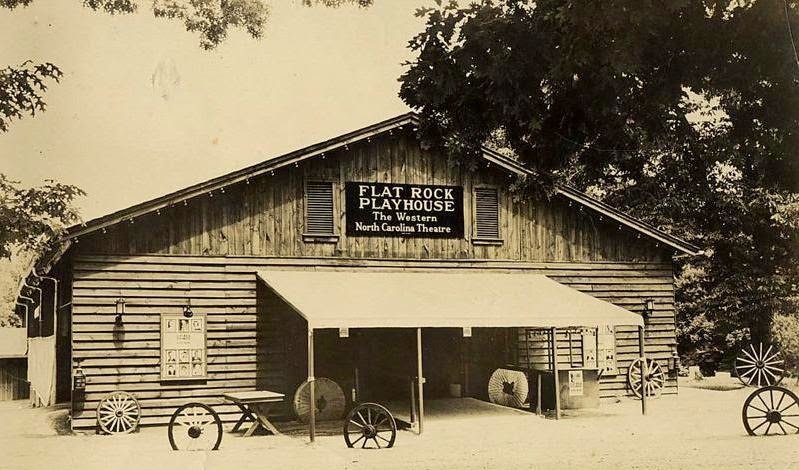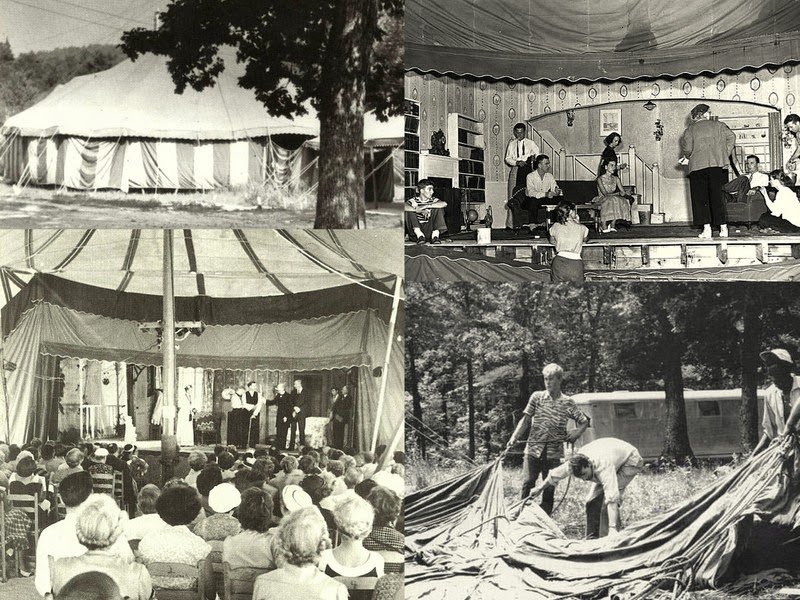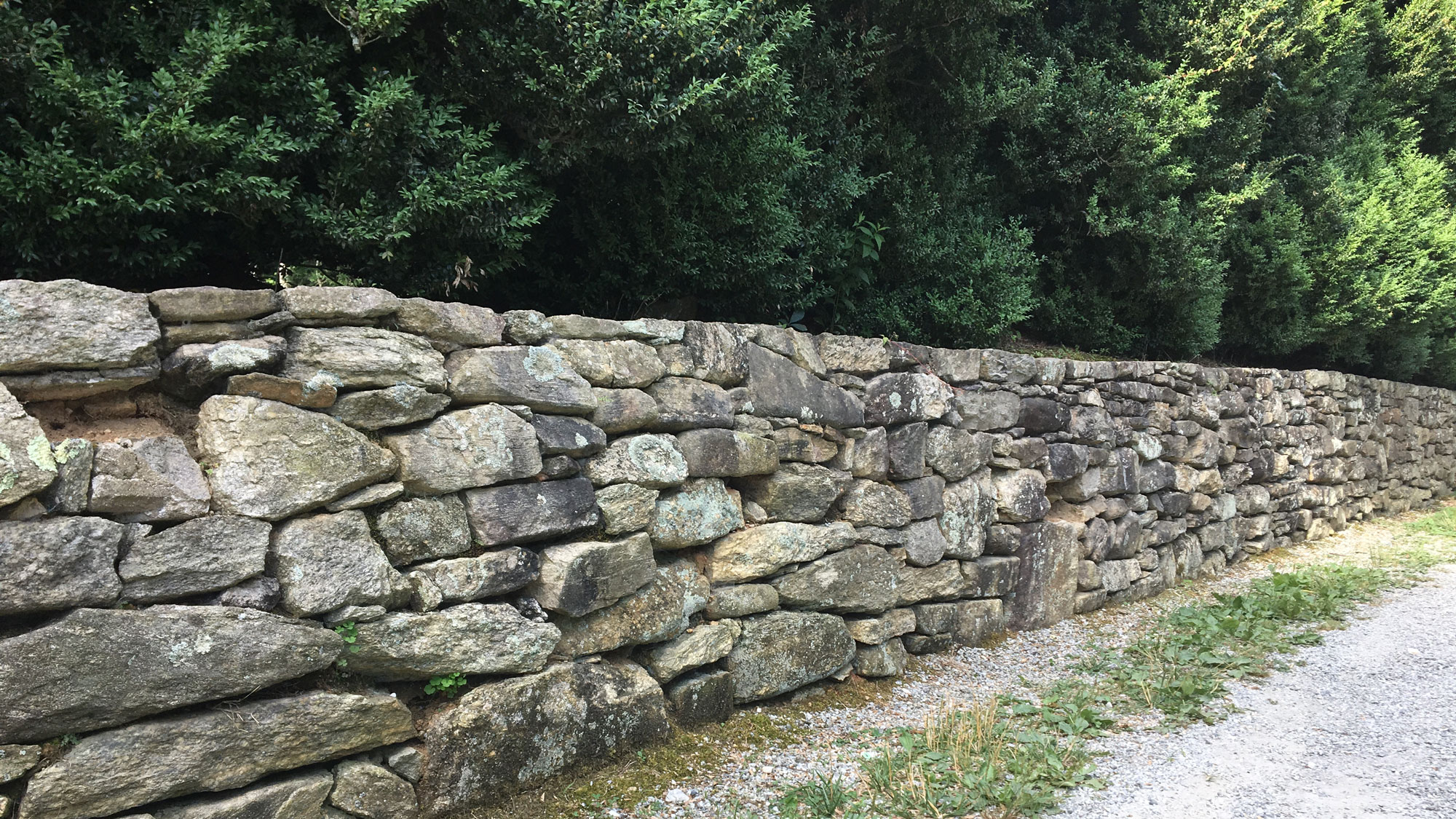Robroy Farquhar; The Early Years 1915- 1951
/This past week marked the 39th anniversary of the passing of Robroy Farquhar, founder of Flat Rock Playhouse, on October 5th, 1983.
The following article is primarily excerpted from Louise Howe Bailey’s book, “50 Years With the Vagabonds.” Additional information was provided by the writing of Jennie Jones Giles’ blog “Henderson Heritage” and articles written by Jim Fitzgerald and Rob Stevenson for The Hendersonville Times News. Links and references to their work are provided below.
This story will be presented in two parts. Part one deals with Robroy Farquhar’s first years in Henderson County up until 1951 and the theater troupes that served as the forerunners of Flat Rock Playhouse.
——
Robroy Farquhar; The Early Years 1915- 1951
In her book, “50 Years with the Vagabonds”, Flat Rock's iconic historian Louise Howe Bailey wrote the following introduction to Robroy Farquhar.
Robroy Farquhar had a dream and he fervently believed it could come true. The story of his Flat Rock Playhouse is one of sacrifices, persistence and trusts that brought his dream to reality, not only as one of the country's most outstanding summer theaters but also as the State Theater of North Carolina. - Louise Howe Bailey
The character of communities is often shaped and defined by the presence of a handful of seminal figures who have the ability to transform the world around them by sheer force of will and tenacity. For Flat Rock, Robroy Farquhar was clearly one of those individuals.
Early Life
Although few people would recognize the name today, Robert William Smith was born in 1910 in Liverpool, England. He immigrated to the United States at the age of 15 and soon became involved with fellow British expatriates in theater circles.
As a lad of fifteen, the son of a Merchant Marine, Robert William Smith left Liverpool to make his home in America. Settling first in Baltimore, he became associated with a group that brought him in contact with … prominent theatrical circles. From then on, he had not one moment’s doubt what he would do with his life.” LHB
According to Bailey, Robert visited Hollywood after arriving in America but decided to forge a different path - and name - for his career.
Although he visited Hollywood and … was offered help to get into motion pictures, he declined. (Instead) he went to New York City borrowing the name of Robroy MacGregor from a Scottish clan chieftain and taking the surname Farquhar from his mother's family.
"It seemed an appropriate stage name,” he wrote to his beloved aunt Gertie in later years. "But I never made it legal.” And he soon dropped McGregor, becoming thereafter Robroy Farquhar.
By the 1930s, Robroy was performing on stage in Upstate New York, Greenwich Village in New York City, and in Florida.
In 1936, Robroy laid the first stepping stone toward his chosen career; he organized a play reading group … The group performed at a number of theaters with Robroy serving as the leading member as well as the manager of the company.
Having performed on a number of stages, the group called themselves the Vagabonds. True to their name, they moved on to Bedford Springs, PA for the summer of 1939, then dropped down to Miami for the winter season, hoping to find a home.
Robroy ended up directing drama at a private school in Miami and it was there, ironically, that he met the people who introduced him to western NC.
(In) Miami he learned that there was a place called Flat Rock in Henderson County, North Carolina. A bond existed between the people of Miami and those of Henderson County for a land boom in Florida in the mid-1920s had brought speculators to the mountain area to purchase properties. Hotels and boarding houses sprung up to accommodate summer vacationers.
Robroy wrote to Preston Patton, chairman of the Hendersonville School Board, suggesting the suitability of the Hendersonville High School auditorium for a theater. Rob Roy emphasized the economic boost the area would derive from the theater, which, if widely publicized "would attract hundreds of new visitors. Local merchants will enjoy increased patronage (and) Henderson County may take great pride in leading Western North Carolina in the astonishingly rapid development of the theater arts throughout the United States.”
Ultimately his proposal of using the high school theater was not successful but true to the nature that would come to define him, Robroy Farquhar did not give up on his dream of finding a permanent home for his acting troupe.
The following year found Robroy still in Henderson County and looking for a place to stage his productions. According to Robroy’s son Robbie, the elder Farquhar “…fell in love with the area. He loved the people. It reminded him of the Scottish Highlands, one of his favorite places.”
In May of 1940, he reported to his financial backer and patron Mrs. Charmine Camine back in Florida;
"I have walked my legs to a mere stub and talked my head off. The astonishing thing is that every single person I have talked with would like to see a stock company in Hendersonville and would probably attend, but without exception, they all contend it would be a financial failure. Suggestions for success are that the theater should have a novelty air … have atmosphere. This looks like a barn set up to me… "
It wouldn’t take long to find a location with that “novelty” air:
The very next day Robroy wrote to Mrs. Carmine again. "After hours of walking and searching, exploring, I came up with the old mill on the edge of Highland Lake camp, with a waterfall tumbling down beside it. The location is excellent the surroundings perfectly beautiful, a more delightful atmosphere couldn’t be achieved anywhere, than on that most alluring spot. In my humble opinion, I believe we've got something here! I get all itchy at the prospect …I estimate we could get in about 150 to 200 seats.”
The Old Mill on the edge of Highland Lake Camp
The Old Mill Playhouse
The Old Mill Playhouse opened in the summer of 1940 and broke new artistic ground in the bucolic setting in western North Carolina. It wasn’t exactly Broadway, but it was a start.
… that summer of 1940, Robroy established the first professional summer stock theater in North Carolina. For two summers the Old Mill that had once ground grist for pioneer settlers and summer residents of the “Little Charleston of the Mountains” served as an auditorium – with the cast ignoring an occasional bat swooping overhead during performances.
Following the end of his second season in 1941, Robroy received a letter from the local Chamber of Commerce commending him which stated in part:
“Hendersonville and this vicinity are proud to have such an organization as this. It is good entertainment for everyone. People from as far away as Athens, GA have written to this office asking about the Playhouse … on behalf of the Hendersonville Chamber of Commerce and the town itself, we are all looking forward to (your) return next year.”
Just as early detractors had suggested when he first arrived in Henderson County, however, the early years of the theater met significant financial challenges. As Robroy explained in correspondence with a friend:
"I must confess that financially I am very much on the spot to be quite frank I have about $20 to my name and no immediate prospect of raising more. Getting a job even temporarily is tough with the army situation hanging over my head. “
The Army Situation
The “army situation” Robroy referenced in his letter was the drumbeat of war already raging in Europe and the prospect that men of Robroy’s age would soon be drafted in anticipation of America’s burgeoning involvement in the worldwide conflict. His acting career and dreams of establishing a permanent theater were placed on hold when became a soldier in the United States Army.
(Robroy) soon found himself an infantryman in General George C. Patton's third army. Or as he put it, "I had just played Elyot Chase in Noel Coward's “Private Lives.” Suddenly I went from Private Lives to the life of a private.”
His son Robbie later recounted that his father told him of just one wartime experience. “They were in a river during a firefight,” Robin says. “They were literally pinned down in the river and were freezing to death. He hated water after that.”
By 1946, the war was over and the irrepressible Robroy was back in Henderson County busy reorganizing his Vagabond troupe.
The Old Mill had been sold, but four miles south of Flat Rock beside Lake Summit, Mrs. Jon A. Law had converted an old schoolhouse into a theater for the Carolina players of Chapel Hill. No longer needed by the Carolina group, the facility became available for Robroy, Dodee Wick, and Mendel Redish to organize an actor’s company. Linda Collins Reed was the producer, and each member contributed $200 to underwrite the first season’s operation. They would be reimbursed at the end of the season. As Mendel Redish put it, “At the Lake Summit Playhouse, the Vagabonds were off and running once again.
The Lake Summit Playhouse was home to the Vagabonds from 1946 to 1951
Lake Summit Playhouse
In June of 1946, the new theater presented its first production. The Vagabonds presented one new show each week for 10 weeks with Robroy serving as producer, manager, artistic director, casting director, and on occasion, as one of the on-stage performers.
The Lake Summit Playhouse ran for four summers, while for two winters Robroy took his troupe to Saint Petersburg, Florida. There the Vagabond made themselves known to many people who regularly came to the mountains in the summer – and who were among the Vagabond’s (summer audiences…)
Robroy and his Vagabonds had a new home, but not one without some challenges. The seating capacity was 200 but half of the audience actually sat outdoors. There was inadequate housing for the troupe, and on top of everything, only a single-lane road led from Lake Summit Road to the Playhouse. In 1948, local attorney Ben Prince hired a work crew to widen the road to allow two cars to pass.
The theater, however, did have its charms.
One redeeming feature of the Lake Summit Playhouse was a room with a fireplace, and during intermission of cool summer nights the fire was lit and the cast sat by it drinking coffee. Sometimes Carl Sandburg joined the troupe after the final curtain; talking, playing his guitar, and singing.
Robroy and Leona Farquhar
Leona
Robroy met his future wife, Leona Fraki, in Miami before the war:
Robroy met Leona when she and her sister hitchhiked from Chicago to Miami. Her sister took a job running the concession stand and Leona often sat and watched during breaks Robroy would join her. “I called him Robbie,” she said later. “He didn’t look like a swashbuckling Robroy, but like a sensitive “Robbie.”
Leona and Robbie lost touch during the war, but in 1948 she contacted Robroy through the Equity group in New York and he told her he needed someone to serve among other things as, a house mother for the girls, food manager, critic. She accepted the offer and proved to be what Mendel Reddish remembers as a "hands-on operator who did not recognize the impossible.”
“If the job is in front of me I try it,” she said. “If I make a mistake, I try again. The impossible just takes a little longer.
On September 20, 1948, Leona and Robroy were married and together they moved the Playhouse ever nearer to the fulfillment of Robroy’s long-standing dream. “He brought showmanship and theatrical enthusiasm,” said their son, Robbie. “She made the nuts and bolts happen. He was the dreamer, she was the doer.”
Mrs. Ruth Conrad’s “Rockworth,” now known as the Lowndes House
Move to Lowndes House
After their marriage, Robroy and Leona occupied a guest cottage at Ruth Conrad’s “Rockworth,” now known as Lowndes House.
Robroy and Mendel often talked to Mrs. Conrad about the Vagabond's need of more space and kept emphasizing what a magnificent spot she had for a playhouse. Besides that, there was ample space for housing the cast.
One Sunday morning in the spring of 1951, Robbie Mendel and Mrs. Conrad sat on The Rock. Mendel remembers "we were drinking coffee and talking, and naturally the Playhouse was the topic of conversation. Presently, "All right,” Mrs. Conrad said, "I agree.“
In that moment, the Vagabonds found a permanent home - where they have resided and thrived for the subsequent 70 years.
—-
(Next : Robroy and Flat Rock Playhouse; 1952 - 1983.)
Sources:
“50 Years With The Vagabonds by Lousie Howe Bailey.
Henderson Heritage Blog. Jennie Giles Jones. https://hendersonheritage.com/robroy-and-leona-farquhar/
“Flat Rock Playhouse Founder Left a Legacy of Magic” by Rob Stevenson reporter Times-News. Link
“Robroy Farquhar Dies at Age 73”, by Jim Fitzgerald; Reporter Times-News. Link


